| |||||
| Decades: | |||||
|---|---|---|---|---|---|
| See also: | Other events of 1998 History of the DRC | ||||
The following lists events that happened during 1998 in the Democratic Republic of the Congo .
| |||||
| Decades: | |||||
|---|---|---|---|---|---|
| See also: | Other events of 1998 History of the DRC | ||||
The following lists events that happened during 1998 in the Democratic Republic of the Congo .
Discovered in the 1990s, human remains in the Democratic Republic of the Congo have been dated to approximately 90,000 years ago. The first real states, such as the Kongo, the Lunda, the Luba and Kuba, appeared south of the equatorial forest on the savannah from the 14th century onwards.
The Armed Forces of the Democratic Republic of the Congo is the state organisation responsible for defending the Democratic Republic of the Congo. The FARDC was rebuilt patchily as part of the peace process which followed the end of the Second Congo War in July 2003.
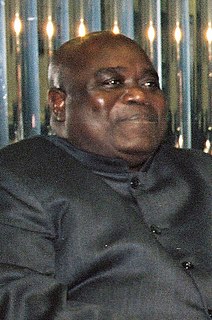
Laurent-Désiré Kabila or simply Laurent Kabila, was a Congolese revolutionary and politician who was the third President of the Democratic Republic of the Congo from 1997 until his assassination in 2001.

The Democratic Republic of the Congo, informally Congo-Kinshasa, DR Congo, the DRC, the DROC, or the Congo, and formerly and also colloquially Zaire, is a country in Central Africa. It is bordered to the northwest by the Republic of the Congo, to the north by the Central African Republic, to the northeast by South Sudan, to the east by Uganda, Rwanda and Burundi, and by Tanzania, to the south and southeast by Zambia, to the southwest by Angola, and to the west by the South Atlantic Ocean and the Cabinda exclave of Angola. By area, it is the second-largest country in Africa and the 11th-largest in the world. With a population of around 108 million, the Democratic Republic of the Congo is the most populous officially Francophone country in the world. The capital and largest city is Kinshasa, which is also the nation's economic center.

Joseph Kabila Kabange is a Congolese politician who served as President of the Democratic Republic of the Congo between January 2001 and January 2019. He took office ten days after the assassination of his father, President Laurent-Désiré Kabila in the context of the Second Congo War. He was allowed to remain in power after the 2003 Pretoria Accord ended the war as the president of the country's new transitional government. He was elected as president in 2006 and re-elected in 2011 for a second term. Since stepping down after the 2018 election, Kabila, as a former president, serves as a senator for life.
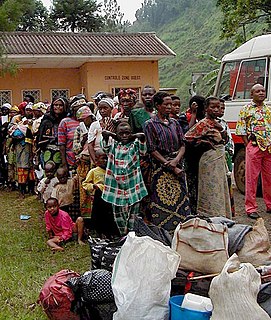
The Second Congo War, also known as the Great War of Africa or the Great African War and sometimes referred to as the African World War, began in the Democratic Republic of the Congo in August 1998, little more than a year after the First Congo War, and involved some of the same issues. The war officially ended in July 2003, when the Transitional Government of the Democratic Republic of the Congo took power. Although a peace agreement was signed in 2002, violence has continued in many regions of the country, especially in the east. Hostilities have continued since the ongoing Lord's Resistance Army insurgency, and the Kivu and Ituri conflicts. Nine African countries and around twenty-five armed groups became involved in the war.

The United Nations Organization Stabilization Mission in the Democratic Republic of the Congo or MONUSCO, an acronym based on its French name Mission de l'Organisation des Nations Unies pour la stabilisation en République démocratique du Congo, is a United Nations peacekeeping force in the Democratic Republic of the Congo (DRC) which was established by the United Nations Security Council in resolutions 1279 (1999) and 1291 (2000) to monitor the peace process of the Second Congo War, though much of its focus subsequently turned to the Ituri conflict, the Kivu conflict and the Dongo conflict. The mission was known as the United Nations Mission in the Democratic Republic of Congo or MONUC, an acronym of its French name Mission de l'Organisation des Nations Unies en République démocratique du Congo, until 2010.

The First Congo War (1996–1997), also nicknamed Africa's First World War, was a civil war and international military conflict which took place mostly in Zaire, with major spillovers into Sudan and Uganda. The conflict culminated in a foreign invasion that replaced Zairean president Mobutu Sese Seko with the rebel leader Laurent-Désiré Kabila. Kabila's uneasy government subsequently came into conflict with his allies, setting the stage for the Second Congo War in 1998–2003.
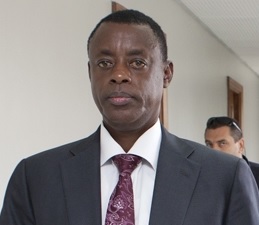
James Kabarebe is a Rwandan military officer who has served as a Senior Presidential Adviser on security matters in the government of Rwanda, since 19 October 2018.
The following lists events that happened during 1998 in Zimbabwe.
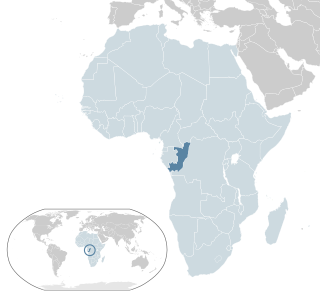
The Second Republic of the Congo Civil War was the second of two ethnopolitical civil conflicts in the Republic of the Congo, beginning on 5 June 1997 and continuing until 29 December 1999. The war served as the continuation of the civil war of 1993–1994 and involved militias representing three political candidates. The conflict ended following the intervention of the Angolan military, which reinstated former president Denis Sassou Nguesso to power.
Congolese history in the 2000s has primarily revolved around the Second Congo War (1998–2003) and the empowerment of a transitional government.
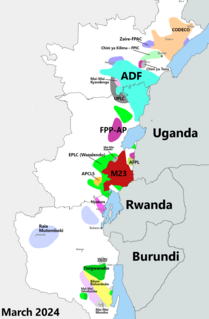
The Kivu conflict began in 2004 in the eastern Congo as an armed conflict between the military of the Democratic Republic of the Congo (FARDC) and the Hutu Power group Democratic Forces for the Liberation of Rwanda (FDLR) in the Democratic Republic of the Congo. It has broadly consisted of three phases, the third of which is an ongoing conflict. Prior to March 2009, the main combatant group against the FARDC was the National Congress for the Defence of the People (CNDP). Following the cessation of hostilities between these two forces, rebel Tutsi forces, formerly under the command of Laurent Nkunda, became the dominant opposition to the government forces.
The Congolese Rally for Democracy, also known as the Rally for Congolese Democracy, is a political party and a former rebel group that operated in the eastern region of the Democratic Republic of the Congo (DRC). It was supported by the government of Rwanda, and was a major armed faction in the Second Congo War (1998-2003). It became a social liberal political party in 2003.

The M23 rebellion was an armed conflict in North Kivu, Democratic Republic of the Congo (DRC), that occurred between the March 23 Movement and government forces. The rebellion was part of continued fighting in the region after the formal end of the Second Congo War in 2003. It broke out in 2012 and continued into 2013, when a peace agreement was made among eleven African nations, and the M23 troops surrendered in Uganda.
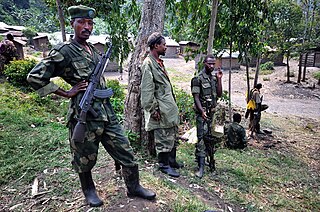
The March 23 Movement, often abbreviated as M23 and also known as the Congolese Revolutionary Army, is a rebel military group based in eastern areas of the Democratic Republic of the Congo (DRC), mainly operating in the province of North Kivu. The M23 rebellion of 2012-13 against the DRC government led to the displacement of large numbers of people. On 20 November 2012, M23 took control of Goma, a provincial capital with a population of one million people, but was requested to evacuate it by the International Conference on the Great Lakes Region because the DRC government had finally agreed to negotiate with them. In late 2012 Congolese troops, along with UN troops, retook control of Goma and M23 announced a ceasefire, saying it wanted to resume peace talks.
The following lists events that happened during 1998 in Libya.
The following lists events that happened during 1998 in Rwanda.
The following lists events that happened during 1999 in the Democratic Republic of the Congo.
Operation Kitona was a Rwandan/Ugandan offensive that marked the beginning of the Second Congo War. Rwanda hoped to depose Laurent-Désiré Kabila and install a government more favorable to Rwanda's interests by quickly taking control of Kinshasa and the strategic western province of Bas-Congo. On August 4, 1998, joint Rwandan and Ugandan forces launched a surprise attack on Kitona airbase in Western Congo using hijacked civilian airliners. While initially successful in taking control of major ports and infrastructure, Zimbabwean and Angolan intervention prevented the Rwandans and Ugandans from taking control of Kinshasa. The invading forces were forced to withdraw to the jungles of Angola until they were evacuated by air to Rwanda ending December 24, 1998.